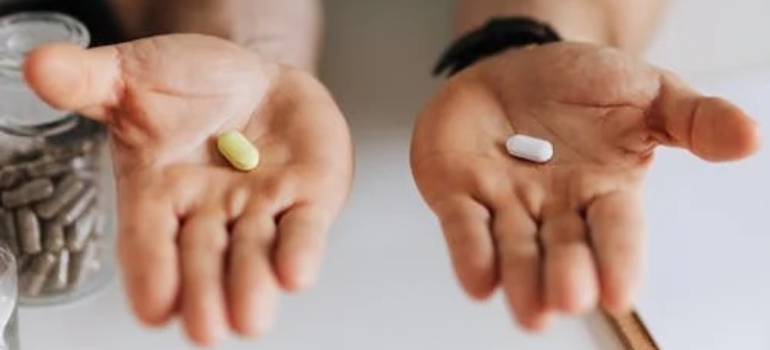Medication-Assisted Treatment (MAT) is an established medical practice with ample benefits, all crucial in facilitating a more comfortable detox process. MAT benefits for addiction recovery extend far beyond the detox phase, as well, helping achieve optimal outcomes. At Harmony Ridge Recovery Center WV, we have diligently examined the profound advantages that MAT offers individuals on their path to recovery. We delve deep into the topic, shedding light on the invaluable benefits that MAT provides. Join us as we explore the intricate facets of MAT, highlighting its instrumental role in promoting successful addiction recovery.
What Is Medication-Assisted Treatment (MAT)?
MAT is a comprehensive approach that combines medications and counseling to support individuals in their journey toward addiction recovery. This evidence-based treatment method is crucial in managing withdrawal symptoms and achieving successful outcomes in addiction recovery.
Unlike do-it-yourself (DIY) detox, MAT offers a structured and supervised approach guided by medical professionals to ensure the most effective and safe detoxification process. By utilizing medications such as methadone, buprenorphine, or naltrexone, MAT assists in addressing the physiological and psychological aspects of addiction. These medications help alleviate withdrawal symptoms, manage cravings, and stabilize brain chemistry, allowing individuals to focus on their recovery without the overwhelming burden of physical and psychological distress. This evidence-based approach allows individuals to regain control over their lives while significantly reducing the risk of relapse.
That said, it bears noting that MAT synergizes best with a strong focus on individual therapy and thorough case management. Such practices serve as crucial components of any reputable program for medication assisted treatment West Virginia offers to help ensure ideal recovery outcomes.

The List of MAT Benefits for Addiction Recovery
With definitions in order, here we should delve deeper into why MAT serves as the cornerstone of most substance abuse treatment WV programs. To do so, we can explore its main benefits.
#1 Improved Treatment Outcomes
First, one of the significant benefits of MAT for addiction recovery is the improvement in treatment outcomes. Numerous studies have demonstrated the effectiveness of MAT in achieving higher success rates compared to other treatment approaches.
For instance, research has shown that MAT significantly reduces the risk of relapse and increases retention in treatment programs. A study published in the Journal of the American Medical Association revealed that MAT with buprenorphine resulted in a 50% decrease in overdose deaths compared to non-MAT treatments. Another study published in the New England Journal of Medicine found that individuals receiving MAT for opioid use disorder had a 50% greater retention rate in treatment after six months compared to those without MAT.
Moreover, MAT has been associated with improved overall well-being, reduced criminal activity, and increased employment rates among individuals in recovery. These findings highlight the effectiveness of MAT as a powerful tool in enhancing treatment outcomes and increasing the chances of sustained recovery. By integrating medications that target the physiological aspects of addiction alongside counseling, MAT offers a comprehensive approach that can fuel the success of drug rehab WV programs.
#2 Reducing Cravings and Withdrawal Symptoms
One of the most significant MAT benefits for addiction recovery lies in reducing cravings and alleviating withdrawal symptoms. The medications utilized in MAT play a crucial role in managing these challenging aspects of addiction.
For example, medications like buprenorphine and methadone work by binding to the same receptors in the brain that addictive substances target, effectively reducing cravings and withdrawal symptoms. By doing so, MAT provides individuals with a sense of stability and relief, allowing them to focus on their recovery journey.

Moreover, MAT can effectively manage withdrawal symptoms associated with various substances, such as opioids or alcohol. The medications used in MAT can help ease the discomfort of withdrawal, including physical pain, nausea, insomnia, and anxiety.
This alleviation of withdrawal symptoms not only makes the detoxification process more comfortable but also increases the likelihood of successful completion. By reducing cravings and managing withdrawal symptoms, MAT empowers individuals to overcome the physiological challenges of addiction, providing a solid foundation for the recovery process.
#3 Addressing Co-occurring Mental Health Disorders
Another significant benefit of MAT comes in its ability to address co-occurring mental health disorders, or “dual diagnosis.” As NIDA reports, studies have shown a high prevalence of co-occurring mental health disorders among individuals struggling with addiction. These can commonly include anxiety, depression, bipolar disorder, or post-traumatic stress disorder and introduce considerable treatment challenges.
MAT offers a comprehensive approach that recognizes the interconnectedness of addiction and mental health issues. The medications used in MAT, such as buprenorphine, have been found to have mood-stabilizing effects, effectively managing symptoms of depression and anxiety. Additionally, MAT benefits for addiction recovery offer individuals the opportunity to receive integrated care. Programs for dual diagnosis treatment West Virginia offers combine medication and counseling to address both their addiction and mental health concerns simultaneously.
By effectively managing dual diagnoses, MAT enhances the overall well-being of individuals in recovery and significantly improves treatment outcomes. It allows individuals to focus on their recovery journey without the added burden of untreated mental health issues, increasing the chances of successful and sustained recovery.

#4 Decreasing the Risk of Relapse
Another vital benefit of this practice comes in its ability to decrease the risk of relapse. Beyond detox, MAT provides ongoing support and stability for individuals in their journey toward recovery.
As outlined above, the medications utilized in MAT help manage cravings, reduce withdrawal symptoms, and stabilize brain chemistry. By addressing the physiological aspects of addiction, MAT significantly lowers the risk of relapse.
Furthermore, MAT incorporates relapse prevention strategies into its treatment approach. Counseling and therapy sessions are often integrated into MAT programs, providing individuals with the necessary tools and coping skills to navigate triggers, stressors, and high-risk situations. Additionally, MAT programs often offer comprehensive support services, including case management, peer support groups, and access to community resources.
These additional components of MAT contribute to a supportive environment that fosters long-term recovery. In doing so, MAT benefits for addiction recovery extend beyond detoxification, ensuring a higher likelihood of sustained recovery and a reduced risk of relapse.
#5 Enhancing Retention in Treatment
Finally, an important benefit of MAT for addiction recovery is its ability to enhance retention in treatment. Indeed, MAT offers several factors that contribute to improved treatment engagement and adherence.
Initially, the medications used in MAT make the treatment process more comfortable and tolerable. This increased comfort and stability play a vital role in individuals remaining engaged in treatment for a longer duration. Having operated the residential treatment center West Virginia trusts for years, we have found this to be true by experience.
MAT programs also often integrate counseling and therapy, providing individuals with the necessary emotional support and coping strategies to navigate the challenges of recovery. When individuals experience positive outcomes and reduced cravings, they are more likely to stay committed to their treatment journey.

Finally, MAT recognizes that addiction is a chronic condition and supports long-term recovery. By offering ongoing medication management and support services, MAT programs provide individuals with the necessary tools and resources to maintain sobriety and navigate the complexities of everyday life. This sustained engagement in treatment, facilitated by MAT, increases the chances of successful and lasting recovery.
Choosing the Right MAT Program
When choosing the right program, several factors should be considered to maximize MAT benefits for addiction recovery. In no particular order, consider the following:
- Evaluating Individual Needs: Each individual’s unique needs should be assessed to determine the most suitable MAT program. Factors such as the type of substance use disorder, medical history, and any co-occurring mental health conditions should be taken into account.
- Finding Qualified Providers: It is essential to seek MAT programs that are offered by qualified and licensed healthcare professionals. Researching the credentials and experience of the providers can help ensure the delivery of safe and effective treatment.
- Considering Accessibility and Support Services: Accessibility plays a crucial role in treatment engagement and adherence. Finding a MAT program that is conveniently located and offers flexible scheduling options can contribute to a more successful recovery journey. Additionally, considering the availability of support services such as counseling, addiction therapy, peer support groups, and case management can provide individuals with comprehensive support throughout their recovery process.
In brief, choosing the right MAT program requires careful consideration of individual needs, qualified providers, and the availability of accessible and supportive services. By selecting a program that aligns with these factors, individuals can receive tailored treatment that maximizes the benefits and increases their chances of successful and sustained recovery.

Choose Harmony Ridge Recovery for Your Partner in Recovery
MAT benefits for addiction recovery are undeniable and can be life-saving. Opting for MAT over risky do-it-yourself (DIY) detox is crucial, as it provides a structured and supervised approach that addresses the complex aspects of addiction. MAT not only helps manage withdrawal symptoms and reduce cravings but also improves treatment outcomes, addresses co-occurring mental health disorders, decreases the risk of relapse, and enhances retention in treatment.
By integrating medications with counseling and support services, MAT offers a comprehensive and evidence-based approach that supports individuals throughout their entire rehab process. For treatment providers and individuals alike, embracing MAT can be the key to unlocking a successful path to recovery.
If you would like to know more about MAT or our services, please feel free to contact us today. Our teams are always available and will gladly answer any questions you may have.



